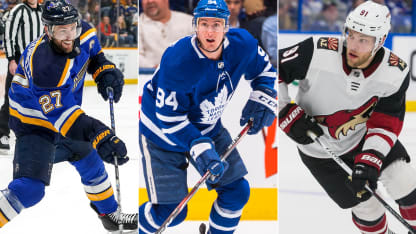Schwartz, like Reinhart, played on a three-year, entry-level contract that was followed by a two-year contract. He grew as a player in the third season of his entry-level contract and got better during his second contract. Reinhart played more on his entry-level contract (249 games) than Schwartz did on his (132 games), but their rate of production wasn't dramatically different. Reinhart averaged 0.56 points per game during his entry-level contract, Schwartz averaged 0.55. Like Schwartz, Reinhart's second contract was for two years and he also grew his game. Schwartz played 108 games on his second contract, in part because he was limited to 33 games in 2015-16 because of injury. He scored 85 points (36 goals, 49 assists), an average of 0.79 points per game. Reinhart played 151 games on his two-year contract, missing the final 13 scheduled regular-season games of 2019-20 because the season was paused March 12 due to concerns surrounding the coronavirus, and scored 115 points (44 goals, 71 assists), an average of 0.76 points per game. That's not a dramatic difference in points per game.

